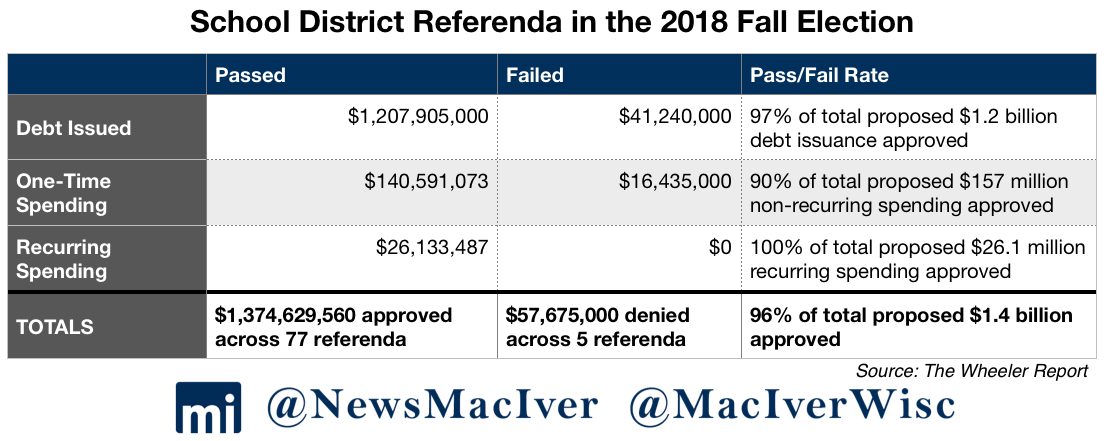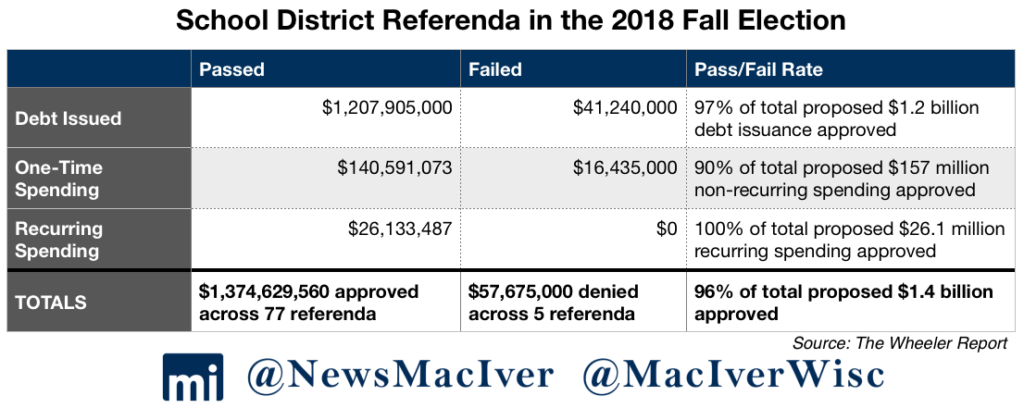
School referenda raise taxes more than $1.3 billion statewide while voters overwhelmingly approve non-binding marijuana questions, split on local transportation spending
November 9, 2018
MacIver News Service | Nov. 7, 2018
By Ola Lisowski and Chris Rochester
MADISON – While much of the state focused on the remarkably close gubernatorial race Tuesday, voters also expressed resounding opinions on ballot measures regarding school referenda and marijuana legalization.
Education spending
Voters overwhelmingly approved school referenda across the state, agreeing to raise taxes by well over $1.37 billion.
In all, 82 separate referendum questions were up for debate in Wisconsin. Ultimately, 77 had passed and five failed.
Of the additional spending approved by voters, the vast majority will come in the form of new debt—$1.2 billion. Another $140.6 million will be one-time spending by school districts, and $26.1 million will be recurring spending above revenue limits.
The Wheeler Report was the first to report full results Wednesday morning.
The approved spending ranges from a recurring $90,000 for a school resource officer in Williams Bay, all the way up to $138.9 million for a new elementary school and renovations in Middleton-Cross Plains. The average dollar amount on the ballot was nearly $17.5 million across 61 school districts. The average dollar amount per referendum approved by voters was $17.9 million.
One particularly large spending increase passed in Wauwatosa School District, where voters approved $124.9 million in new debt for the construction of four elementary schools, and for other renovations across the district. The ballot measure passed handily with 61 percent of the vote. District taxpayers will pay off the new debt over 20 years.
Voters in the Cedarburg School District approved a $59.8 million debt issuance for district renovations in a 53-47 vote. That measure had drawn statewide attention after local concerns of a biased survey were brought to light.
Two votes resulted in stunningly close outcomes. In Big Foot UHS, a $7.8 million debt issuance question to construct a new outdoor athletic facility was split closely down the middle. A difference of 33 votes pushed the result just above 50 percent, with 2,189 voters voting for the measure and 2,156 voting against. An announcement on the high school’s website celebrated the vote, writing “we would like to share our excitement and gratitude to the Big Foot Community for approving both referendum questions!“
A measure in River Valley asked voters to consider a one-time payment of $6.55 million to maintain educational programs and operations. In that measure, 2,514 voted no and 2,326 voted yes, a difference of 188 votes.
Three different types of referendum questions were posed to voters across the state. The most common question issues debt to be repaid over upwards of ten years. Other referendums can ask taxpayers for one-time (non-recurring) spending, or recurring spending above state-imposed revenue limits.
Of the five referendum votes that failed, the largest was in Viroqua Area, where voters turned down the question of a $24.9 million debt for a district-wide school building and improvement program. A West Salem referendum question for $7.6 million in one-time spending for educational programming failed, as did $2.25 million for Goodman-Armstrong.
Voters in Wittenberg-Birnamwood also turned down a $4.4 million debt question for a new high school gymnasium. However, the same voters also agreed to issue $13.1 million in debt for a district-wide facility improvement plan.
In a night when multiple elections appeared to come down to slim margins, most of the school district referendum questions were handily approved.
In recent years, outgoing Gov. Scott Walker and the Republican Legislature have reformed the referendum process with hopes to protect taxpayers from ever-increasing property tax bills. While voters in individual school districts may elect to raise their own taxes, voters outside of those districts are still affected, as the average property tax burden rises across the state.
In the past, districts could pose referendum questions during special elections, and could repeatedly propose the same question in consecutive elections. Now, school district referenda can only occur during regular elections, in an effort to get more voters deciding major spending questions.
School district referenda have become increasingly popular in recent years.
Voters have approved $9.7 billion in tax increases through school district referendum questions since 1999. According to the Wheeler Report’s analysis, “districts are asking for more money less often.” Referenda to issue new debt have been the most common type of ask, and Tuesday night’s election was no different. Forty-four of 82 referendum questions on Tuesday were in the form of new debt, while 24 asked for one-time spending above revenue limits and 14 for recurring spending.
Non-binding marijuana questions
In addition to the flood of school district referenda, voters in 18 localities were asked their thoughts on marijuana legalization in a series of advisory referenda on ballots statewide. Some questions asked whether the drug should be legalized for recreational purposes, others for medical use only.
While none of the questions are legally binding on local governments or the state Legislature, voters overwhelmingly said, yes, pot should be legal—especially for medicinal purposes.
The widest margins were for medicinal marijuana questions in Kenosha County and the city of Racine, where 88 percent of respondents said the drug should be legalized for medical use, while 12 percent said no. Racine also asked if it should be legal for recreational use—while fewer agreed with that, 66 percent of voters still approved the question.
Liberal Dane county asked voters if they support recreational marijuana. “Should marijuana be legalized, taxed and regulated in the same manner as alcohol for adults 21 years of age or older?” voters were asked. Seventy-six percent said yes.
Milwaukee county asked if voters would support just medical marijuana. “Should the State of Wisconsin allow individuals with debilitating medical conditions to use and safely access marijuana for medical purposes, if those individuals have a written recommendation from a licensed Wisconsin physician?” the ballot read. Seventy percent said yes.
Eau Claire, Racine county, and the city of Racine asked multiple choice questions, asking voters whether they approve of legalizing pot for either medical or recreational purposes.
On average, voters were more likely to green light legalizing medicinal pot. The statewide average of “yes” to that question was nearly 78 percent. But in the six questions asking if voters would approve of recreational pot, nearly 61 percent on average said yes.
The only marijuana ballot question that failed was Eau Claire’s question on medical marijuana, where voters were asked to give a preference between medical, recreational, or no change. Fifty-four percent chose recreational, 31 percent chose medical only, and just 15 percent voted to keep the drug illegal.
Even in the conservative-leaning city of Waukesha, 77 percent said marijuana should be legalized for medical purposes and regulated in the same manner as other prescription drugs.
The non-binding advisory referenda are intended to send a message to lawmakers about public support on the issue.
More money for roads?
Voters throughout the state also faced a variety of transportation funding questions. La Crosse county presented a series of four ballot questions asking voters if they supported spending $5 million more on roads and gave them three options for how to fund it.
An overwhelming majority—78.1 percent—agreed with the question, “Do you support the County investing $5 million annually to address needed road and bridge repairs?” That comes on the heels of a months-long campaign by local officials to convince voters there is a $100 million backlog of unmet road maintenance needs.
Asked if they support a special sales tax on tourism-related businesses, called a Premiere Resort Area Tax, 68.2 percent agreed, mirroring a previous advisory referendum on the same question. But voters overwhelmingly rejected a $56 wheel tax—68.4 said no while 31.6 percent agreed. Even more, 73.8 percent, said the county shouldn’t fund the additional road spending by borrowing.
Voters in six other localities were asked for permission to exceed state-imposed revenue limits to fund increased road spending. They include:
- Village of Richfield, passed 51-49 percent
- Town of Arbor Vitae, passed 62-38 percent
- City of New Holstein, failed 58-42 percent
- Town of Trenton, failed 56-44 percent
- Town of Sugar Creek, passed 55-45 percent
- Village of Bloomfield, failed 70-30 percent
Voters in Buffalo county also saw a non-binding advisory referendum on the ballot asking voters whether they support borrowing $4 million for road repair, “restoring county roads and maintenance to a thirty (30) year pavement life cycle.” That passed overwhelmingly, 70-30 percent.
Legislative caucuses plan to meet Thursday to choose new leaders for the coming session.
